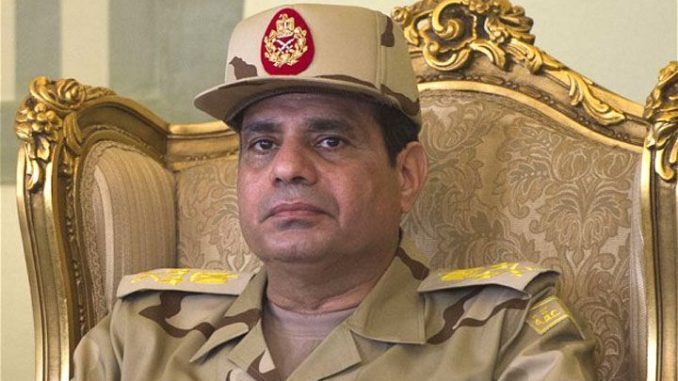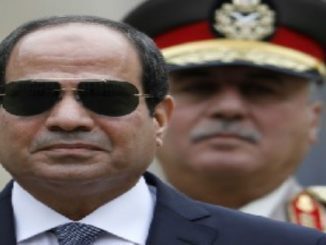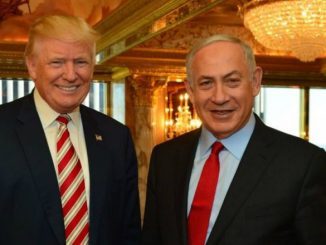
When it comes to securing a second term in power, Egypt’s coup leader is leaving little to chance.
Ahead of March elections, Egypt’s al-Sisi sidelined his potential rivals. Some were jailed or threatened with prosecution. The news media is largely in his pocket. On polling day, Egyptians will have no choice except to choose al-Sisi for a second term.
In this context, a coalition of eight Egyptian opposition parties and some 150 pro-democracy public figures called for a boycott of the March presidential election, calling it an “absurdity” and comparing the government’s handling of the vote to that of “old and crude dictatorships.”
Al-Sisi is virtually certain to win a second, four-year term in the March 26-28 vote. A face-saving candidate’s last-minute entry spared the government the embarrassment of a one-candidate election but drew a torrent of criticism and mockery on social media.
The call for a boycott by the Civilian Democratic Movement came just days after five opposition figures, including a 2012 presidential candidate and two top campaign aides for now-arrested presidential candidate Sami Annan, called on voters to stay away from ballot boxes and on Egyptians not to recognize the vote’s outcome.
“It is not right for us to surrender to what has become an absurdity bordering on madness,” Abdel-Geleel Mustafa, a veteran opposition figure, told a news conference at one of the parties’ headquarters in Cairo.
Hamdeen Sabahy, who finished a distant second behind al-Sisi in the 2014 election, called on other pro-democracy groups to join the coalition. “Come and let us stand together. This is a moment when the people will make their say known and, God willing, the say of the people will prevail,” he told the news conference.
The ideology of the eight parties is rooted in the 2011 revolution that ended the 29-year autocratic rule of Hosni Mubarak.
They and others have since been sidelined by al-Sisi, who has waged one of the most sweeping crackdowns on dissent in Egypt’s modern history.
The parties have limited support on the ground, in large part due to restrictions on their activities placed by security agencies. Their call for a boycott, however, could dampen turnout.
The parties said their young members came up with the slogan “stay home” for their boycott campaign. Speakers for the parties did not say what they intend to do to make the boycott effective.
However, Abdel Fattah al-Sisi sternly warned the opposition that he won’t tolerate their plans to organize a boycott of national elections, after independent candidates dropped out of the race, according to Middle East Monitor.
Now, political analysts say hope is fading.
Egyptian elections typically attract low turnout, particularly when the outcome is a foregone conclusion. After a string of would-be challengers were arrested, forced out or quit the race, the prospect of a virtual referendum — not unlike those held by autocratic rulers in the past — had clouded the election.
Moussa Mustafa Moussa, a little-known politician and a staunch supporter of al-Sisi, submitted his documents this week, just minutes before the election commission’s deadline. Moussa is the leader of the Ghad, or Tomorrow, party, which does not have a single seat in parliament.
The national election authority said that both al-Sisi and Moussa had met the requirements and declared them official candidates.
Moussa told a news conference Monday that he did not intend to be a “prop” in the election. But until a few days ago, he was a staunch supporter of el-Sisi’s re-election.
Amy Hawthorne is the deputy director of research with the Project on Middle East Democracy in Washington. Hawthorne said as cited by Voice of America that although Sisi said he wanted a true election, he didn’t really want competition.
“The fact that several of these would-be candidates came from the military was even more apparently threatening to him, and so using a variety of measures, and tricks and means, the Egyptian authorities have managed to either disqualify on very shaky grounds these would-be candidates, or has intimidated, threatened and pressured them, their families, their supporters, leading them to pull out,” she said.
She said the effort to suppress the opposition is a waste, because many people think it likely that Sisi would win a fair election.
The opposition parties say Mousa is simply running to give the impression of a fair election. Mousa has said he is running to help the country and that he is acting independently of al-Sisi.
Other regional analysts say Sisi’s control of the government is complete. They say parliament has introduced laws that impede freedom of expression and criminalize civic society activities.
In addition, the Egyptian judiciary has abandoned the rule of law, said Sahar Aziz, a law professor at Rutgers University in the U.S. state of New Jersey.
“By rule of law I mean open and fair hearings by unbiased and qualified judges, a degree of predictability and limitation of arbitrariness of government actions and a level of individual rights and freedoms in accordance with international norms,” Aziz said.
Seven years ago, thousands of Egyptians took to the streets in protest against the government led by President Mubarak. When Mubarak was forced out of office, and democratic elections put the country’s first civilian leader in decades in office, there was hope for lasting political change.
However, hopes vanished when General Abdel Fattah al-Sisi, the Defense Minister at that time, led a military coup that ousted his predecessor, Mohamed Morsi – Egypt’s first freely elected civilian president.
Since then, critics said that al-Sisi’s government has engaged in human rights violations, imprisoning journalists and members of the opposition.
“As long as the current regime is not willing to open up the political space, I think we are going to see a continuation of a status quo which is a high level of repression and a kind of parliamentary façade but is really only a façade,”said Shadi Hamid, a senior fellow at the Brookings Institution in Washington.
Dalia Fahmy, an associate professor of political science at Long Island University, in New York state, said the military has tightened its grip over political and social life, and the media.
Under these conditions, she thinks it will be very difficult to promote democracy.
Fahmy said, “From within it has to be a level of political openness, there has to be the ability for dissidents to congregate, form political parties, a level of political contestation, but more so there has to be a free and vibrant media.”
She also added that part of the problem is mainly because many regional and Western governments tolerate al-Sisi.
“The international community really needs to hold the repressive regime accountable. We can’t continue this signaling game that you signal one thing to the people and something else to the regime,” she said.
In the same context, Shadi Hamid said the U.S. administration has shown little public interest in promoting Middle East democracy.
Some in the administration of President Donald Trump say security for Egypt and the region is their primary concern, given the threat of attacks from Palestinian or Islamic State militants.
Some advocates of U.S. policy say the administration does support human rights, although discreetly.
Hamid said, “I think that is problematic because terrorism does not fall from the sky; terrorism, extremism and political violence arise from a particular context and if there is a very repressive and closed context, that is actually a more conducive environment for extremism.”
Hawthorne explained saying that part of the problem is that many Western countries are exhausted by years of tumult in the Middle East.
She also said that since dictatorships can create temporary stability, many Western governments tolerate them as they focus on short-term solutions. Ultimately, she said, repressive governments fall. “We can be sure that another wave of change and popular unrest will be coming,” Hawthorne said.And, she said, it is likely the international community will be unprepared.



